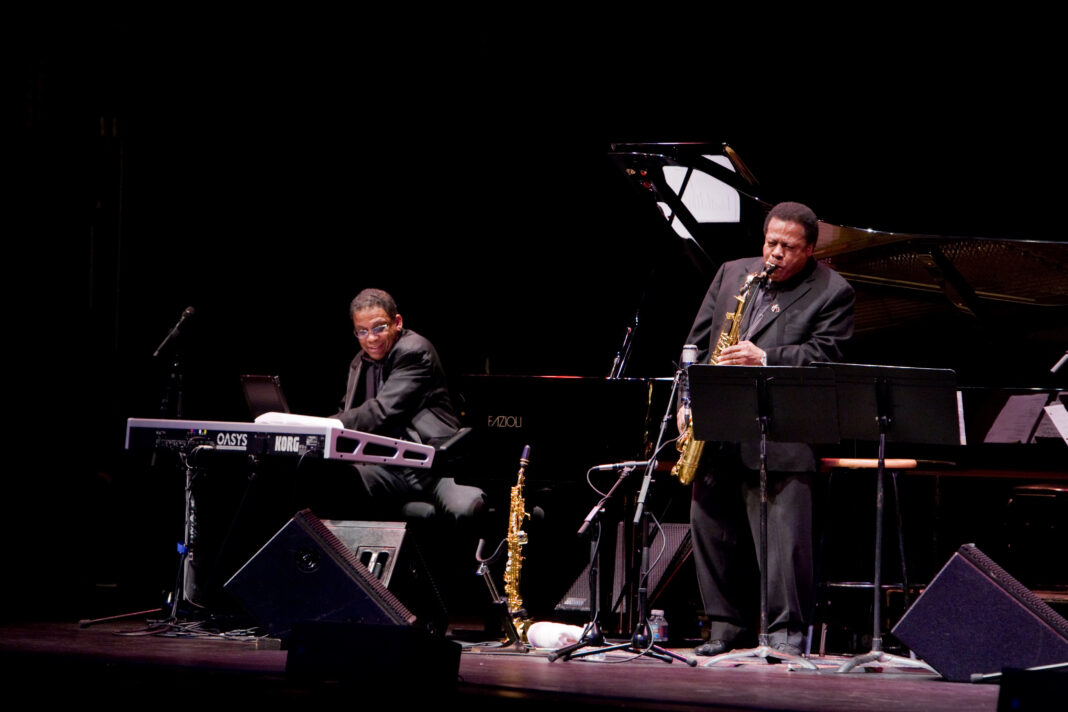On March 2, our beloved co-president of the International Committee of Artists for Peace, Wayne Shorter, died. He was 89.
In a career spanning eight decades, Mr. Shorter, a twelve-time Grammy Award winner, came to be known as both a jazz icon and one of America’s great composers.
He began in the late 1950s as a performer/composer with Art Blakey’s Jazz Messengers. Then in 1964, he joined Miles Davis’s Second Great Quintet, where, along with Mr. Davis, he played alongside other legends of jazz, Ron Carter, Tony Williams, and Herbie Hancock (who is ICAP’s other co-president).
By 1970, Mr. Shorter co-founded, with Austrian keyboardist Joe Zawinul, one of the seminal jazz fusion bands: Weather Report.
Throughout his illustrious career, he was a pioneer who pushed the boundaries of musical artistic expression on many fronts.
For example, a 2008 review by Ben Ratliff of The New York Times begins:
“Months ahead of time Wayne Shorter’s 75th birthday concert at Carnegie Hall was being described as a kind of collaboration with Imani Winds, a classical wind quintet. This caused minor concern among fans leading up to the show on Tuesday. It isn’t that Mr. Shorter, probably jazz’s greatest living small-group composer and a contender for greatest living improviser, shouldn’t be going outside his territory; the lessons of 20th-century classical music have become inseparable from his composing.”
Recent years saw Mr. Shorter receiving many prestigious accolades for his lifetime of service to the artform of jazz. Among them:
In 2014, he received the Grammy Lifetime Achievement Award in honor of his “prolific contributions to our culture and history.”
He was a joint winner of the 2017 Polar Music Prize in Sweden, whose selection committee noted: “Without the musical explorations of Wayne Shorter, modern music would not have drilled so deep.”
And in 2018, during a ceremony that is broadcast annually throughout the United States, Mr. Shorter received the Kennedy Center Honors Award for his lifetime of contributions to the arts.
And 2021-22 saw the premiere of a project that was fulfilled a dream Mr. Shorter had had since the 1950s, creating a jazz opera based on the Greek mythological character Iphigenia. In collaboration with esperanza spalding; world-renowned architect, Frank Gehry; and others, the opera Iphigenia was completed and performed in venues on both coasts of America.
Mr. Shorter’s ever-evolving artistry and numerous achievements made a massive impact . . . as is evident from the praise of his peers, many of whom are luminaries in their own right. To enjoy a comprehensive tribute to Wayne Shorter and his music, click here, where you can listen to a special episode of NPR’s Jazz Night in America, hosted by noted jazz bassist Christian McBride.
The practice of Nichiren Buddhism was an essential ingredient in Mr. Shorter’s life and was a driving force behind his music and endless artistic creativity. And accordingly, Mr. McBride tweeted about Mr. Shorter, quoting from the Buddhist website sokaglobal.com:
“From the Buddhist perspective, life and death are two phases of a continuum. Life does not begin at birth nor end at death. Everything in the universe—from invisible microbes in the air we breathe to great swirling galaxies—passes through these phases. Our individual lives are part of this great cosmic rhythm . . . Everything in the universe, everything that happens, is part of a vast living web of interconnection. The vibrant energy we call life which flows throughout the universe has no beginning and no end. Life is a continuous, dynamic process of change.”
Adding,
“Wayne, we will forever feel you as the light of your next phase now officially activates.”
Also on Twitter, Herbie Hancock wrote:
“Wayne Shorter, my best friend, left us with courage in his heart, love and compassion for all, and a seeking spirit for the eternal future. He was ready for his rebirth. As it is with every human being, he is irreplaceable . . . and was able to reach the pinnacle of excellence as a saxophonist, composer, orchestrator, and recently, composer of the masterful opera, Iphigenia. I miss being around him and his special Wayne-isms, but I carry his spirit within my heart always.”
One of his earliest hit compositions, written, according to Mr. Shorter, “when Miles [Davis] asked me for something to play at gigs,” is titled “Footprints.” Acclaimed guitarist Carlos Santana, who often performed with Mr. Shorter, once said of him: “When we trace the footprints, we discover that this brilliantly creative entity, who we thought was so complex and unknowable, is instead a marvelous emissary of light and a messenger of a higher truth.”
Wayne Shorter was a tireless champion of promoting peace through artistic expression, demonstrated in part by his ceaseless activities for ICAP, since its inception. In service of a peaceful humanity, he united hearts through the vastly creative possibilities that burst forth from his music. Long may the “Footprints” through which he made his presence felt inspire people everywhere, especially the youthful artists of the world, to continue making their own invaluable contribution to peace through the transformative power of the arts.

